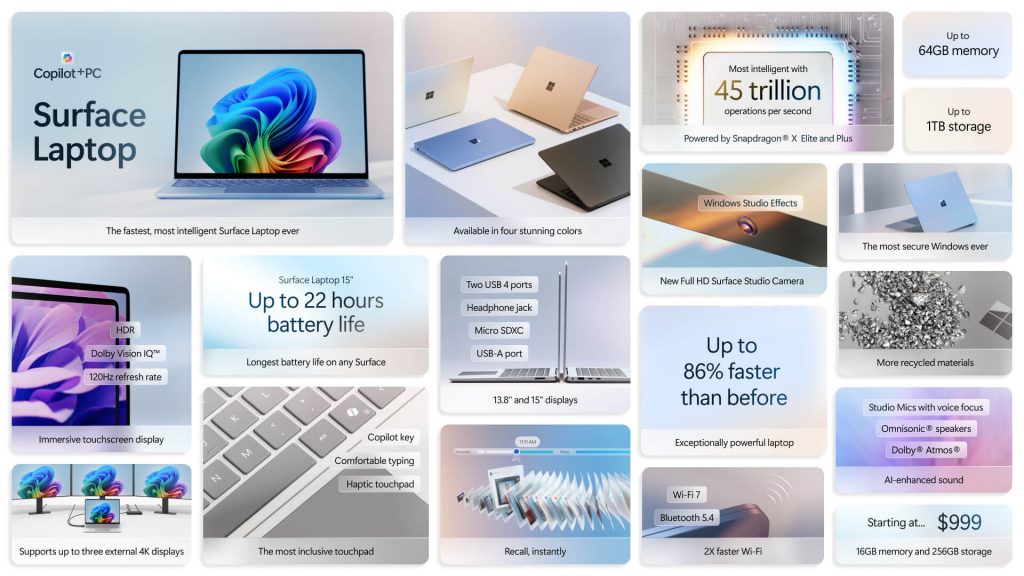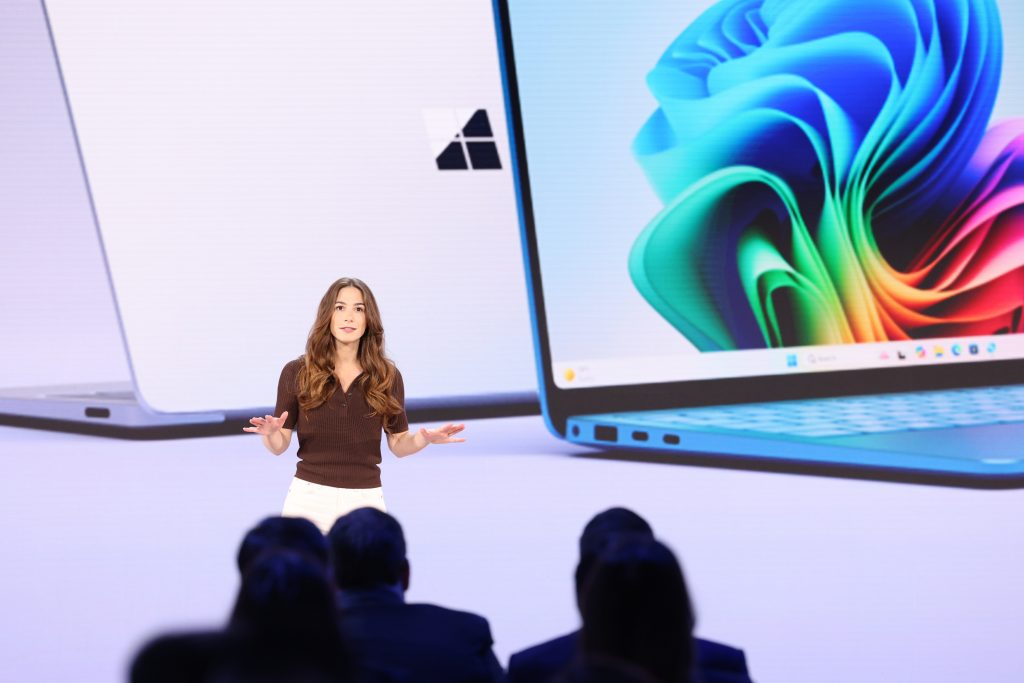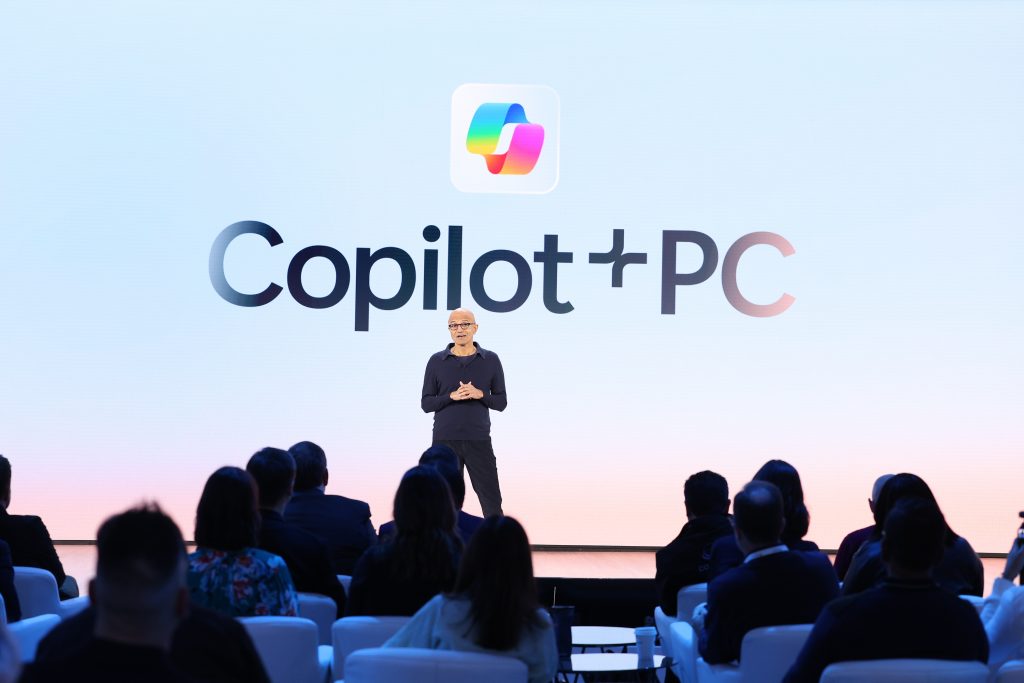Microsoft Bets Big on AI with New Copilot+ Laptops
| By Loc Le |
“Computers that understand us versus us having to understand computers”
Just a week after the groundbreaking GPT-4o model was launched by Microsoft-backed OpenAI, Microsoft has unveiled a new category of personal computers that will leverage the model and are particularly built to support AI capabilities. Officially known as Copilot+ PCs, this new lineup of Windows PCs, which are currently only limited to laptop models, were publicly introduced at the company’s annual Build event where it was emphasized how these AI-centric devices would drastically boost user productivity and enhance everyday tasking. While Microsoft’s new 13.8” and 15” Surface Pro laptops were the main Copilot+ PCs showcased during the event, it was also mentioned that Acer, ASUS, Dell, HP, Lenovo, and Samsung will also be releasing laptops, all of which will be available starting on June 18th with varying specifications and prices. According to CEO Satya Nadella, this development further advances Microsoft’s long-time goal to “build computers that understand us versus us having to understand computers.”
Optimizing Hardware for AI Computing
Considered by Microsoft as the “most significant change to the Windows platform in decades,” all Copilot+ PCs will be equipped with powerful hardware specifically optimized for AI computing. At a minimum, each Copilot+ PC will need to have 16GB of RAM, 256GB of storage, and a neural processing unit (NPU) that records at least 40 TOPs (trillions of operations per second). In combination with a CPU and GPU, this NPU will be a part of a new system architecture that will yield advanced levels of performance and enable generative AI processes to run locally instead of in the cloud. When compared to specific Windows desktops and laptops that are currently available, Microsoft also claims that Copilot+ PCs “are up to 20x more powerful and up to 100x as efficient for running AI workloads and deliver industry-leading AI acceleration.” And when tested against Apple’s 15” M3 MacBook Air, Copilot+ PCs were found to be 58% faster and have 20% more battery life with the ability to last for 15 to 22 hours on a single charge depending on the usage.

New AI-Enhanced Features Can Promote Productivity …
By leveraging the advanced hardware and enhanced performance capabilities, Copilot+ PCs will include new innovative AI features such as Recall. This standout feature, which was heavily highlighted by Microsoft at the Build event, allows users to seamlessly find past engagements on their PCs by using natural language prompts via text or voice inputs. These prompts are then fulfilled by presenting the user with relevant snapshots of their laptop’s past activity which are gathered by using AI-processed data that includes anything that has ever been on the users’ screen as well as their emails, documents, and chat threads. For example, if a user previously saw a restaurant online that they were interested in and now wanted to go there but can only remember scare details about it, they can use the Recall feature to pull up snapshots and find it again.
… But the AI Features Raise Privacy and Security Concerns
While certainly intuitive, this feature was bound to be met with security and privacy concerns which Microsoft preemptively addressed by emphasizing how the information used and produced by Recall will be strictly stored locally and never used to train its AI models. The company also elaborated on how users can manage Recall’s privacy controls by filtering out certain apps and websites from ever being saved and also being able to “delete individual snapshots, adjust and delete ranges of time in Settings, or pause at any point.” Despite these measures, privacy experts such as Jen Golbeck, a professor of AI at the University of Maryland, still believes that Recall can pose substantial issues if someone were to gain unauthorized access into a Copilot+ PC. “Stuff may stay on your device, but that doesn’t mean people can’t get to it,” says Golbeck who also mentions how using incognito mode or clearing histories won’t be effective since the tool sees everything that goes on a user’s screen by default. Furthermore, the UK’s independent regulator for the Information Commissioner’s Office also told CNN that Recall is being investigated “to understand the safeguards in place to protect user privacy.”
Enhancing Accessibility with Live Captions and More
In addition to Recall, Copilot+ PCs will also include a new AI-powered tool called Live Captions which will be able to instantly translate any audio from over 40 languages into English subtitles in real time, even without an internet connection. Existing applications are also set to receive upgrades. Cocreator and Restyle Image, for example, are two tools that will be available in Paint and Photos which will allow users to take their drawings, pictures, and text prompts to generate or refine new images.
Copilot, Microsoft’s AI assistant and the concept which the company built on for these new PCs, will also be receiving significant upgrades including a fully dedicated application and integration with OpenAI’s GPT-4o model. Microsoft also briefly talked about updates to third-party applications on Copilot+ PCs such as DaVinci Resolve Studio, CapCut, Cephable, LiquidText, djay Pro, and Adobe’s Photoshop, Lightroom, Express, Illustrator, and Premiere Pro.

Shaping the Future of AI-Driven Computing
While only a handful of information was provided on Copilot+ PCs, the surface has only been scratched and the future of AI-focused computing already looks promising. With powerful hardware, remarkable new features, and the endless capabilities of AI, these devices provide a brief glimpse of how people can benefit from the integration of AI technology into their daily lives. Not only is this development a significant step in Microsoft’s long-term goal, as stated by CEO Nadella, but it is also a massive leap for the technology industry as AI is increasingly becoming more available to consumers. This growth, however, must coincide with the equal progression of AI privacy and security regulations. Otherwise, the perception around AI will be met with more concerns and disdain rather than innovation and enthusiasm.
Photo Credits: Microsoft



